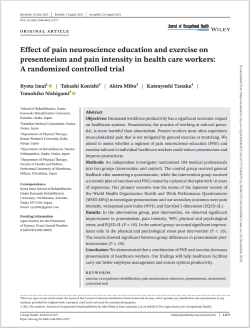#0135 Know Pain for No Pain! Pain Neuroscience Education Can Improve Work Productivity in Medical Workers

Know Pain for No Pain! Pain Neuroscience Education Can Improve Work Productivity in Medical Workers
Presenteeism implies physical presence at the workplace, albeit with poor work productivity due to an underlying medical condition. Presenteeism can take a toll on the physical and mental well-being of employees, and can eventually lead to absenteeism, thereby, contributing to the socioeconomic burden of the workplace. It is frequently observed across healthcare workers who spend long hours at their workplace, and can often manifest as musculoskeletal pain of the neck and back. Previous studies demonstrate that exercise and stretching alone may not be the remedy for managing presenteeism in medical workers.
In a recent study, researchers have explored the potential of exercise combined with pain neuroscience education (PNE), an approach that helps people change their perception and threshold of pain, to alleviate musculoskeletal pain. They conducted a randomized controlled trial with 104 medical professionals to compare the effects of a regimen of exercise and PNE, designed by an experienced therapist, versus a feedback-based assessment without any interventions.
The participants in the intervention group were given instructions regarding individualized exercises, including specific stretches and walking, targeting their regions of pain; they were also checked-in with twice a month to ensure treatment compliance. Furthermore, they received guidance on practicing PNE, which focused on various aspects of the nervous system, pain sensitivity, and perception.
In addition, the researchers used the Japanese version of the World Health Organization Health and Work Performance Questionnaire (WHO-HPQ) to evaluate presenteeism following interventions. Further, they assessed pain intensity, sensitization, quality of life, psychological and physical stress, and overall health status, using relevant questionnaires.
Their analysis revealed that participants from the intervention group exhibited significant improvements in presenteeism, pain intensity, quality of life, and physical and psychological stress while those from the control group showed improvement only in work-related stress. These findings suggest a positive influence of PNE combined with an exercise regimen on presenteeism in medical workers. This can help physical therapists evaluate and address individual specific areas of concern, and recommend treatment accordingly, to improve employee management and ensure optimal work productivity in medical practice.

Link to the original journal article:
https://academic.oup.com/joh/article/63/1/e12277/7249879
Title of the paper:
Effect of pain neuroscience education and exercise on
presenteeism and pain intensity in health care workers: A randomized controlled trial
Authors:
Ryota Imai, Takashi Konishi, Akira Mibu, Katsuyoshi Tanaka, Tomohiko Nishigami




